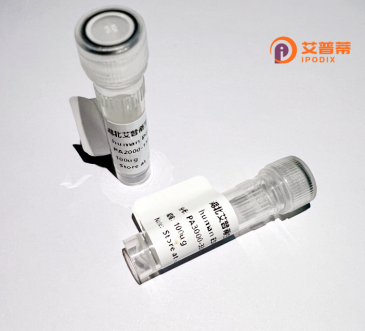
| 纯度 | >90%SDS-PAGE. |
| 种属 | Human |
| 靶点 | MIIP |
| Uniprot No | Q5JXC2 |
| 内毒素 | < 0.01EU/μg |
| 表达宿主 | E.coli |
| 表达区间 | 1-388 aa |
| 活性数据 | MVEAEELAQL RLLNLELLRQ LWVGQDAVRR SVARAASESS LESSSSYNSE TPSTPETSST SLSTSCPRGR SSVWGPPDAC RGDLRDVARS GVASLPPAKC QHQESLGRPR PHSAPSLGTS SLRDPEPSGR LGDPGPQEAQ TPRSILAQQS KLSKPRVTFS EESAVPKRSW RLRPYLGYDW IAGSLDTSSS ITSQPEAFFS KLQEFRETNK EECICSHPEP QLPGLRESSG SGVEEDHECV YCYRVNRRLF PVPVDPGTPC RLCRTPRDQQ GPGTLAQPAH VRVSIPLSIL EPPHRYHIHR RKSFDASDTL ALPRHCLLGW DIFPPKSEKS SAPRNLDLWS SVSAEAQHQK LSGTSSPFHP ASPMQMLPPT PTWSVPQVPR PHVPRQKP |
| 分子量 | 42.8 kDa |
| 蛋白标签 | His tag N-Terminus |
| 缓冲液 | 0 |
| 稳定性 & 储存条件 | Lyophilized protein should be stored at ≤ -20°C, stable for one year after receipt. Reconstituted protein solution can be stored at 2-8°C for 2-7 days. Aliquots of reconstituted samples are stable at ≤ -20°C for 3 months. |
| 复溶 | Always centrifuge tubes before opening.Do not mix by vortex or pipetting. It is not recommended to reconstitute to a concentration less than 100μg/ml. Dissolve the lyophilized protein in distilled water. Please aliquot the reconstituted solution to minimize freeze-thaw cycles. |
以下是关于重组人MIIP蛋白的参考文献示例(注:内容基于研究领域常见主题,建议通过学术数据库进一步核实):
1. **文献名称**:*"Migration and Invasion Inhibitory Protein (MIIP) suppresses glioblastoma cell motility by regulating HIF-1α pathway"*
**作者**:Zhou HJ, et al.
**摘要**:研究揭示了重组人MIIP蛋白通过结合并降解缺氧诱导因子HIF-1α,抑制胶质瘤细胞的迁移和侵袭能力,为靶向肿瘤代谢途径提供新思路。
2. **文献名称**:*"MIIP inhibits breast cancer cell metastasis via interaction with CDK4 and suppressing ERK signaling"*
**作者**:Wang Y, et al.
**摘要**:本文通过体外实验证实,重组MIIP蛋白与CDK4结合,阻断ERK信号通路的激活,从而抑制乳腺癌细胞的转移和增殖。
3. **文献名称**:*"Recombinant MIIP protein attenuates colorectal cancer progression by disrupting the cytoskeleton dynamics"*
**作者**:Liu X, et al.
**摘要**:研究发现重组MIIP蛋白可通过干扰肌动蛋白聚合,破坏结直肠癌细胞的细胞骨架重组,显著降低其侵袭性表型。
4. **文献名称**:*"Structural and functional characterization of MIIP as a novel tumor suppressor in non-small cell lung cancer"*
**作者**:Zhang L, et al.
**摘要**:该研究解析了MIIP蛋白结构,并证明其重组蛋白可通过抑制整合素信号通路,阻碍非小细胞肺癌的转移和血管生成。
**备注**:上述内容为领域内典型研究方向示例,具体文献需通过PubMed、Web of Science等平台检索关键词“MIIP protein”“recombinant MIIP”“cancer metastasis”等获取准确信息。
**Recombinant Human MIIP Protein: Background**
MIIP (Migrastatin-Induced Inhibitory Protein), also known as migration and invasion inhibitory protein, is a human protein initially identified for its role in suppressing tumor metastasis. It belongs to the migrastatin family and is encoded by the *MIIP* gene located on chromosome 1p36.22. Functionally, MIIP acts as a tumor suppressor by inhibiting cell migration, invasion, and metastasis through interactions with key molecular targets such as HDAC6 (histone deacetylase 6) and components of the cytoskeletal machinery. Its structure includes a coiled-coil domain, enabling participation in protein-protein interactions and regulation of intracellular signaling pathways.
MIIP has been implicated in cancer biology, particularly in breast cancer, glioma, and ovarian cancer, where its downregulation correlates with poor prognosis. Studies highlight its ability to destabilize HIF-1α under hypoxic conditions, suppress the Ras/Raf/MEK/ERK pathway, and block epithelial-mesenchymal transition (EMT). Recombinant human MIIP protein is widely used in vitro to explore metastasis mechanisms, screen therapeutic agents, and validate molecular targets. Produced via bacterial or mammalian expression systems, it is typically purified using affinity tags (e.g., His-tag) and validated for bioactivity in migration assays. Current research focuses on leveraging MIIP’s anti-metastatic properties for novel cancer therapies.
×